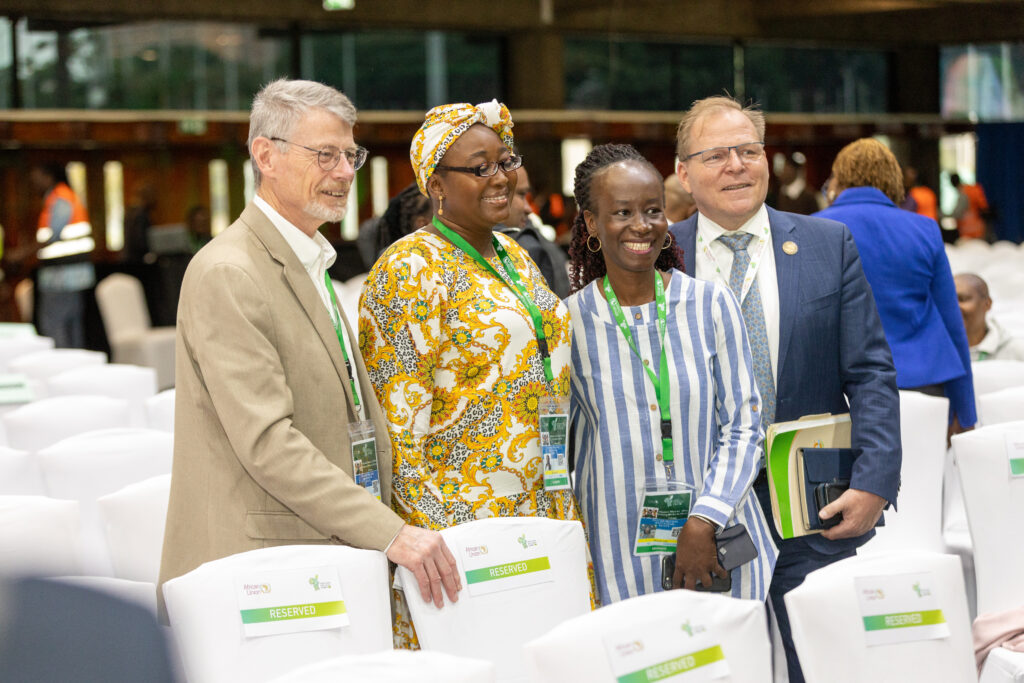
Representatives from the International Fertilizer Development Center (IFDC) participated in the Africa Fertilizer and Soil Health (AFSH) Summit, held May 7-9 in Nairobi, Kenya. The event, organized and facilitated by the African Union, brought together farmers, experts, policymakers, researchers, and representatives of international organizations, all dedicated to the pursuit of sustainable and productive agriculture in Africa.
The goals of the AFSH Summit were twofold. First, it was designed to convene stakeholders that are relevant to fertilizer and soil health in stimulating sustainable productivity growth in African agriculture. Second, the summit was an opportunity to ratify the African Fertilizer and Soil Health Action Plan and the Soil Initiative for Africa.
Throughout the summit, attending organizations shared their expertise in technical sessions demonstrating the latest research and innovations in integrated soil fertility management. IFDC representatives presented case studies and success stories from several projects across the African continent, including:
- AfricaFertilizer
- Soil Values program
- Enhancing Growth through Regional Agricultural Input Systems (EnGRAIS) Project for West Africa
- SOILS Space to Place
- HortiNigeria
- Toward Sustainable Clusters in Agribusiness through Learning in Entrepreneurship (2SCALE) program
- Communal Approach to the Agricultural Market in Benin Phase 3 (ACMA3)
These presentations highlighted the positive impacts of IFDC’s 50 years of interventions in agricultural productivity and soil health.

Building Partnerships
The summit also served as an opportunity to strengthen strategic partnerships and create new opportunities for collaboration to enhance food security and agricultural sustainability in Africa. IFDC, the International Institute of Tropical Agriculture (IITA), the African Plant Nutrition Institute (APNI), and the Forum for Agricultural Research in Africa (FARA) signed a coalition agreement – the Coalition of Implementers for Soil Health (CIFSH) – during the AFSH Summit to commit to long-term collaboration after the event. The coalition’s purpose is to harness the research capabilities and resources of these organizations to advance soil health via fertilizer management.
The Fertilizer and Soil Health Hub for West Africa and the Sahel was also launched at the AFSH Summit. Collaborators involved in this initiative established a partnership to reiterate their commitment to a sustainable, food-secure future. The hub will promote agricultural efficiency to increase profits and improve soil health for smallholder farmers. It builds on the goals of the 2006 Abuja Declaration, which encourages the financing and use of fertilizer as a method for Africa to begin a “Green Revolution.”

Feeding the Future
The AFSH Summit underscored the importance of effective and sustainable fertilizer management for food security in Africa. The Nairobi Declaration, developed by leaders of the African Union in preparation for the summit, states that the African Fertilizer and Soil Health Action Plan and the Soil Initiative for Africa Framework will be the key guiding documents to harness multi-stakeholder partnerships and investments. Their messages will drive policies, finance, research and development, markets, and capacity building for fertilizer and sustainable soil health management in Africa.
In his remarks at the summit, IFDC President and CEO Henk van Duijn asserted the need for coalition support to meet the goals of the Nairobi Declaration: “To ensure that we can implement the work which is dedicated in the action plan in all the countries, the countries will need support from coalitions … The coalition agreement between IFDC, APNI, FARA, and IITA will ensure that with government funding that is already available and new funding that is coming up, we can support the countries which are now starting to implement their country’s agriculture investment plans as a follow up of the action plan they just approved.”
The declaration confirms that Africa is committed to tripling domestic production and distribution of certified quality organic and inorganic fertilizers by 2034 to improve access and affordability for smallholder farmers. The declaration specifies that African fertilizer use is only at 13% (18 kilograms per hectare) of the global rate (135 kilograms per hectare).
Dr. Latha Nagarajan, IFDC’s Feed the Future Sustainable Opportunities for Improving Livelihoods with Soils (SOILS) Consortium Director, felt inspired to act after the summit. “What a fascinating summit. We hit two birds with one stone: fertilizer and soil health. As the President of Zambia put it, we should not wait for anything to happen over the next 10 years. We should have stringent targets and we should complete this. Let’s make this happen.”
Soil Health for Sustainability
Soil health in Africa is of increasing concern for many agricultural organizations, especially as it relates to fertilizer use. Some African soils are lower than average in organic matter, so it is essential that some organic fertilizers are supplemented for the good of the soil. Soils containing organic matter are more prepared to filter water and store vitamins and minerals, which enrich crops for human consumption.
Many of the initiatives discussed at the AFSH Summit, such as the Nairobi Declaration, relate to researching and championing agricultural solutions that involve sustainable fertilizer use for improved soil health. Experts emphasize that sustainable use does not require the removal of all inorganic (mineral) fertilizers. Positive trends in agricultural yield have been associated with combination organo-mineral fertilizers. Mixing both kinds of fertilizer decreases the negative effects associated with either, while increasing the positive effects on agricultural productivity and soil fertility.
The Nairobi Declaration’s section on soil health outlines that the African Union will restore at least 30% of degraded African soils by 2034. Utilizing and improving upon existing methods for integrated soil fertility management will help to uncover ways in which organic fertilizers can be agriculturally and economically beneficial for smallholder farmers.
The African Union is adapting the Nairobi Declaration’s goals into National Agricultural Investment Plans, thus extending the declaration’s impact far beyond the AFSH Summit. The next 10 years should reveal successes for governments, farmers, policymakers, and researchers alike, as they all work toward creating a more food-secure world.




